This past weekend, I had to do one of my least favorite activities: attend a wedding.
It’s number two of three that Max and I have been invited to this year. In 2024, there were five. This venue was in Manhattan, a twenty minute walk from our apartment, so it was a significantly easier commute than others. Plus I was happy to see Max after five weeks apart. Still, while dressing up on Sunday afternoon, I found myself compiling a mental list of what I would have preferred to be doing.
Washing every dish in my cabinets by hand. Sitting through high school geometry class. Reading a 700-page Ron Chernow biography on some dead military general. Going to the gynecologist. They all rank high above weddings.
Now, I’m sure some of my friends who have invited me to their nuptials are reading this newsletter and frowning. In particular my friend from college who became a wedding planner (if you are getting married, you should definitely check out Moxxie Street Events; she’s damn good). So, let me be clear. It’s not that I don’t want to see people say “I do,” or that I won’t cheer them on from the crowd before taking to the dance floor when ABBA comes on. Not exactly. I’m not trying to yuck anyone’s yums. It’s that I think the whole practice has sort of lost the plot; that weddings too quickly become about money, power, and privilege rather than the couple’s love.
Admittedly, it’s not just weddings I don’t enjoy but the entire concept of matrimony, most especially women marrying men, thanks to its roots in misogyny. Clementine Ford unpacks this idea brilliantly in her book I Don’t: The Case Against Marriage. It’s no secret women have been sold, kidnapped, and shackled into unhealthy partnerships—usually without any rights of their own—since the beginning of time. Unethical marriage practices are carried out in parts of the world today. Even in places where they are less abundant, the fight for gender equality continues. It wasn’t until 1974 that U.S. women could apply for their own credit card without a husband or father’s approval, and up until 1976 they needed a partner to sign off if they wanted an abortion. Now with the SAVE Act, married American women who have changed their surnames will also struggle to vote.
Women don’t hold such demoralizing powers over men. In fact, studies have shown that in heterosexual marriages it’s the male partner who benefits, statistically living longer and happier lives than their wives. Men tend to have better financial benefits to getting married, too.
The money piece of this is a big point where I take issue with the actual weddings themselves. The average American wedding costs $36,000, according to Zola, up $7,000 the past two years. In the state of New York, this price zooms up to nearly $58,000. For the same price you could buy an Audi sedan or cover a year’s tuition at the University of Southern California. Many of the ceremonies I’ve attended have taken place in the Empire state and almost all of the couples I know have spent at least $20,000. The costliest price tag from a ceremony I’ve attended came in at $700,000; one trellis floral arrangement apparently cost roughly the equivalent of my take home salary. Learning this made me physically too sick to consume the fourth and fifth dinner courses.
I’ve also heard friends complain about the “wedding tax,” the belief that services such as catering and photographers come at a higher cost than for other events. I’m not sure if that’s true, but I do know that my decision to check the “Will Attend” box comes at a cost. Even if I’m not traveling overnight to the venue (and majority of the time, I am), I still have to account for a dress, shoes, and make-up. Weddings have increasingly turned into entire weekends composed of the day-of celebration as well as bookending cocktail hours and brunches, neither of which feel necessary. Plus of course I must choose a gift from the couple’s registry. I’ve seen these items range greatly. Sometimes there are oodles of housewares despite the fact the partners have lived together for years and gotten on fine without matching weighted blankets or an $800 espresso machine. Other times it’s specific activities for their honeymoon, i.e. kayaking or a massage; things I can’t afford for myself, let alone someone else. Most common seems to be sending along cash that the couple can use for whatever they want; perhaps buying a house, or paying off the wedding debt…
This especially angers me. It feels as if the only points at which it is socially acceptable to ask your friends and family for money is if you’re engaged or having a baby. But there are a lot of other special moments outside of these options. Graduations and new homes and quitting toxic jobs or relationships! These milestones deserve the same kind of praise. And frankly, the people going through them probably need your help more than those who have any kind of capital to throw at a big party.
Speaking of size, I’m not sure that the scale of weddings is warranted, either. Do you really have hundreds of folks who need to be there? Do you truly like that many people? If pressed to list out who I actually care about enough to invite to such an event, I could probably get to 25 names, 30 tops. I’ve been a guest at a few receptions where I did not know the bride or the groom—where I didn’t meet them that evening—and yet I knew they paid at least $125 for my seat. Or, in some cases, their parents did.
That’s yet another piece of wedding culture that irks me. How in a certain social class, parents will dish out lots of cash for their adult kid’s wedding then proceed to take over various elements. I think there can be cases where this financial help aligns with the couple’s vision. But I’ve mostly seen the opposite play out. An example of this is parents inviting everyone they’ve ever met. Their sophomore year college roommate! Their hairdresser! The lady that lived down the street from you growing up who when you passed her house on your bike occasionally waved! I’ve also witnessed families encouraging more formalization and religious inclusion than the couple themselves is comfortable with. This stuff slowly takes away what keeps me agreeing to attend these damn things: the couple.
Perhaps my anti-wedding stance is surprising given my adoration of romance at-large. I read and watch tons of romantic comedies, and the novel I’m drafting falls into this category. But I don’t feel the two are mutually exclusive. I appreciate love in its many forms. I just don’t believe every story has to result in marriage, and certainly not in a wedding. For me, being in love means you’ve found your person. For me, having the person is enough.
There’s too much pressure around a wedding being the best day of a person’s life, as well, when in reality they are destined to be crazy and disorganized. I don’t like that kind of anxiety. I don’t like the idea that little girls should be expected to dream of their weddings. Similar to the “best day” thing, this narrative is limiting. There are lots of folks who will never tie the knot, whether by choice or by circumstance, and they will have happy lives. I’d prefer to think that the best day of your life can happen during any myriad of accomplishments or adventures. Maybe the best day of your life isn’t a single day but a lot of little fantastic moments that if you put them together constitute twenty-four hours. Isn’t that a beautiful thought?
Plus, I’ve always related to the Carrie Bradshaw school of thought: the day little girls should imagine is not their wedding, but that of their book launch parties. Now that is a good reason to invite the whole world.
Rachel’s Weekly Recs:
I’m on the hunt for the London Fog Earl Grey Tea Milano Cookies. The treats are a limited edition flavor featuring the beloved beverage and have received rave reviews, but I’ve struggled to find them. Reach out to me if they show up in your local grocery store.
My mom gave me these Emotional Support Desktop Tortoises last week and they’re giving me so much joy. The set is complete with a mother and child, heat lamp, and of course snacks. What better way to distract from the emails I don’t want to read?
I recently learned the dating show Are You The One? (where folks are secretly paired through a matchmaking algorithm, then must live together to find their “perfect matches”) had a fully bisexual season in 2019, and I am here for the drama. You can see a highlights clip here for a taste of the chaos.


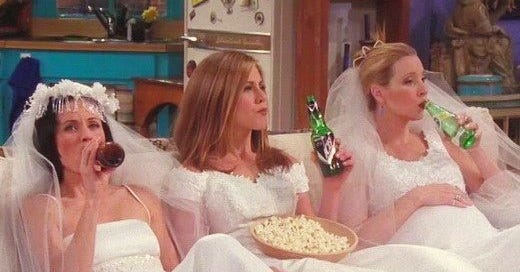



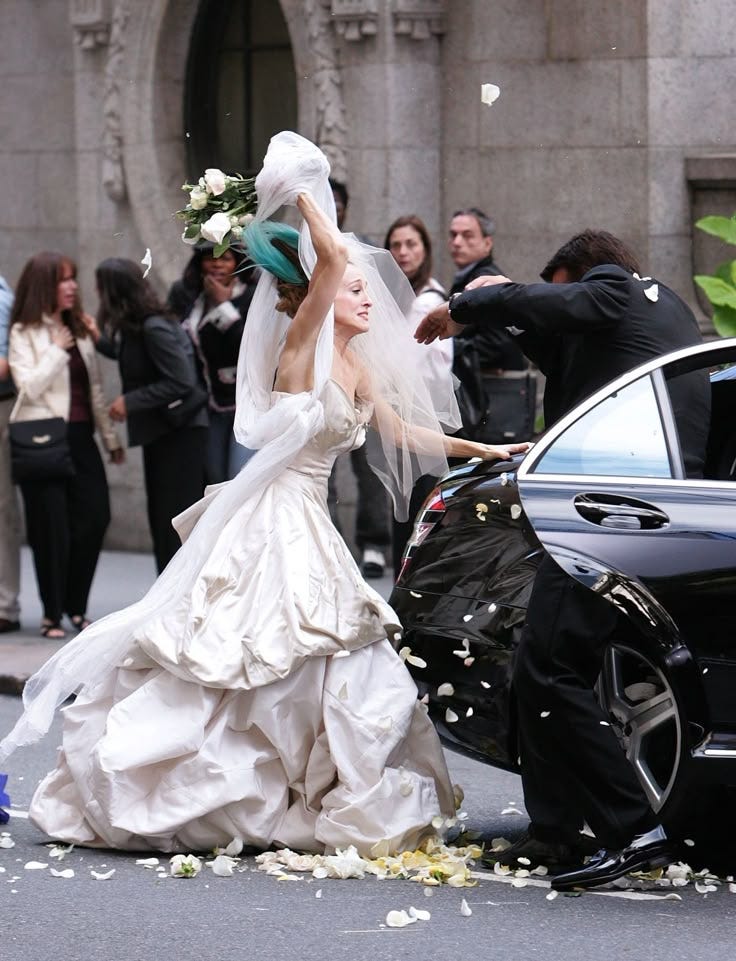
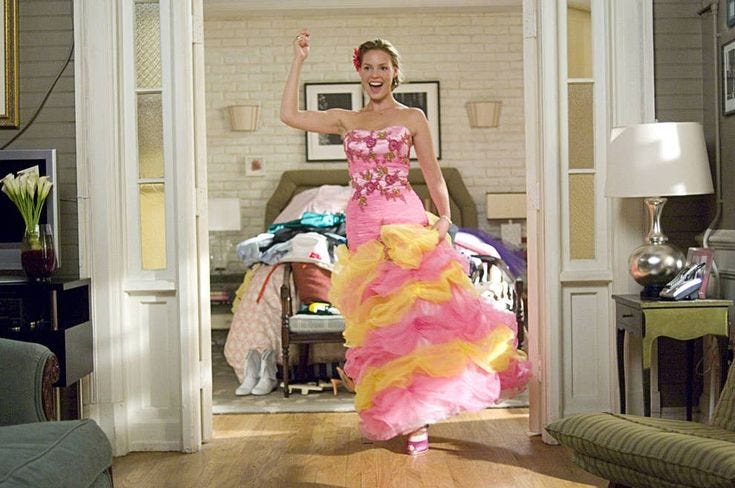
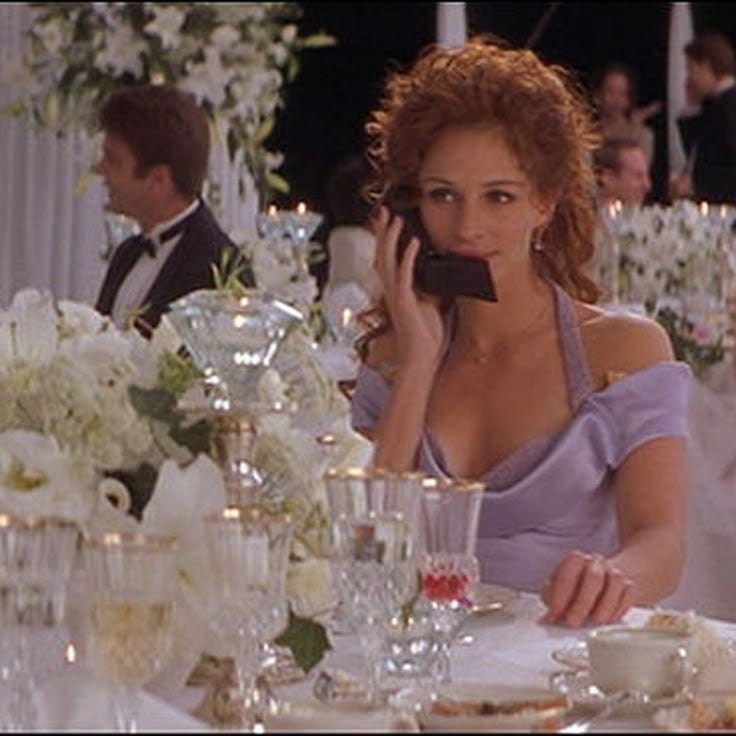
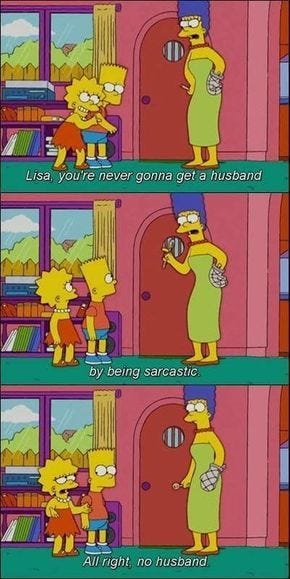
Sadly, these thoughts and comments are just too true concerning many weddings - not all, but many. Think long and hard before venturing forth...?